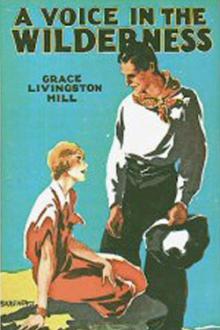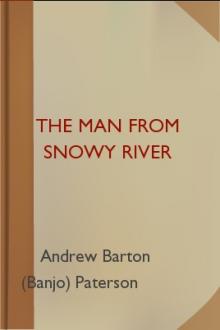The Gringos<br />A Story Of The Old California Days In 1849, B. M. Bower [cheapest way to read ebooks TXT] 📗

- Author: B. M. Bower
Book online «The Gringos<br />A Story Of The Old California Days In 1849, B. M. Bower [cheapest way to read ebooks TXT] 📗». Author B. M. Bower
"Bill, you're crazy!" It was Jack, white to the lips in sheer terror for Wilson, Jack who refused to blench at his own dire strait, who sprang up and clapped a hand over the mouth that was sealing the doom of the owner. "Take him out, Jim, for God's sake! Take him—Bill, listen to me, you fool! What was it you were telling me, there in your own doorway, to-day? About not thinking out loud? You can't save me by talking like that! These men—those that don't hate me—are so scared of their own necks that they wouldn't lift a finger to save a twin brother. Take him out, boys! Bill doesn't mean any harm." He tried to smile and failed utterly. "He likes me, and he's—he's—"
Shorty it was who jerked him away from Bill. The Captain, on his feet, was dominating the uneasy crowd with his cold stare more than with the gun he held in his hand.
"This Committee," he stated in his calm, judicial tone, which chilled the growing fire of excitement and held the men silent that they might listen, "this Committee regrets that in the course of its unpleasant duties it must now and then rouse the antagonism of a bad man's friends. But this Committee must perform the duties for which it was elected. This Committee is sorry to see Mr. Wilson take the stand he takes, but it realizes that friendship for the condemned man leads him to make statements and threats for which he should not be held responsible. Gentlemen, this court of inquiry is dismissed, and it may not be amiss to point out the necessity for order being maintained among you. The Committee would deeply regret any trouble arising at this time."
"Oh, damn you and your Committee!" gritted Bill Wilson, out of the bitterness that filled him. He gave Jack one glance; one, and with his jaws set hard together, turned his back.
The crowd pushed and parted to make way for him. Jim, his face the color of a pork rind, followed dog-like at the heels of his boss. And when they had passed, the tent began to belch forth men who walked with heads and shoulders a little bent, talking together under their breaths of this man who dared defy the Committee to its face, and whose daring was as impotent as the breeze that still pulled at the flapping corner of the cloth sign over the door of his place.
Bill glanced dully up at the sign before he opened his door. "Better get the hammer and nail that corner down, Jim," he said morosely, and went in. He poured a whisky glass two-thirds full of liquor and emptied it with one long swallow—and Bill was not a drinking man.
"God! This thing they call justice!" he groaned, as he set down the glass; and went out to make an attempt at organizing a rescue party, though he had little hope of succeeding. Jack was a stranger to the better class of business men, and those who did know him were either friends of the Committee or in deadly fear of it. Still, Bill was a gambler. He was probably putting the mark of the next victim on himself; but he did not stop for that.
Jack sat looking after the crowd that shuffled through the doorway into the sunlight. He thought he had believed that he would receive the sentence which the juryman had spoken so baldly; yet, after the words had been actually spoken, he stared blankly after Bill and the others, and incredulously at the Captain, who seated himself upon a bunk opposite to watch his prisoner, his pistol resting suggestively upon his knee. The boy lingered to shake Jack's unresponsive hand and mutter a broken sentence or two of gratitude and sympathy. But Jack scarcely grasped his meaning, and his answer sounded chillingly calm; so that the boy, wincing under the cold stare of the Captain and the seeming indifference of the prisoner, turned away with downy chin a-tremble and in his eyes the look of horrified awe which sometimes comes to a youth who has seen death hesitate just over his head, pass him by, and choose another. In the doorway he stopped and looked back bewildered. Jack had said that he loved life and would hate to leave it; and yet he sat there calmly, scraping idly with his boot-toe a little furrow in the loose sand, his elbows resting on his knees, his face unlined by frown or bitterness, his eyes bent abstractedly upon the shallow trench he was desultorily digging. He did not look as the boy believed a man should look who has just been condemned to die the ignominious death of hanging. The boy shuddered and went out into the sunlight, dazed with this glimpse he had got of the inexorable hardness of life.
Jack did not even know when the boy left. He, also, was looking upon the hardness of life, but he was looking with the eyes of the fighter. So long as Jack Allen had breath in his body, he would fight to keep it there. His incredulity against the verdict swung to a tenacious disbelief that it would really come to the worst. So long as he was alive, so long as he could feel the weight of the dagger in his sleeve, it was temperamentally impossible for him to believe that he was going to die that day.
Plans he made and smoothed them in the dirt with his toe. If they did not bind his arms... They had not tied Sandy's arms, he remembered; and he wondered if a dagger concealed in Sandy's sleeve would have made any essential difference in the result of that particular crime of the Committee. He sickened at a vivid memory of how Sandy had ridden away, just a week or so before; and of the appealing glance which he had sent toward Bill's place when Shorty started to lead the buckskin from before the prison tent with six men walking upon either side and a curious crowd straggling after. Would a dagger in Sandy's sleeve have made any difference?
Then his thoughts swung to the Mexican who had told him of the trick, only the night before. It had amused Jack to experiment with his own knife; and the very novelty of the thing had impelled him to slip his dagger into the new hiding-place that morning when he dressed. The Captain had not discovered it there—but would it make any difference? It occurred to him that he need not die the death of dangling and strangling at the end of the rope, at any rate; if it came to dying... Jack became acutely conscious of the steady beat in his chest, and immediately afterward felt the same throb in his throat; he could stop that beating whenever he chose, if they did not bind his arms.
"Horse's ready, Captain," announced Shorty succinctly, thrusting his head through the closed flaps; and the Captain rose instantly and made a commanding gesture to his prisoner.
Jack swept the loose dirt back into the furrow with one swing of his foot and stood up. He went out quietly, two steps in advance of the Captain and the Captain's drawn pistol, and advanced unflinchingly towards the horse that stood saddled in the midst of the group of executioners, with the same curious crowd looking on greedily at the spectacle.
"Ever been on a horse?" asked the Captain, his deep voice little more than a growl.
"Once or twice," Jack answered indifferently.
"Climb on, then!"
Jack was young and he was very human. It might be his last hour on earth, but there rose up in him a prideful desire to show them whether he had ever been on a horse; he caught the saddle-horn with one hand and vaulted vaingloriously into the saddle without touching a toe to the stirrup. The buckskin ducked and danced sidewise at the end of the rope in Shorty's hand, and more than one gun flashed into sight at the unexpectedness of the move.
The Captain scowled at the exclamations of admiration from the crowd. "You needn't try any funny work, young man, or I'll tie you hand as well as foot!" he threatened sternly. "Give me that rope, Davis."
Then Jack paid in pain for his vanity, and paid in full. The Captain did not bind his arms—perhaps because of the crowd and a desire to seem merciful. But though he merely tied the prisoner's ankle after the usual manner, he knotted the small rope with a vicious yank, pulled it as tight as he could and passed the rope under the flinching belly of the buckskin to Davis, on the other side. Also he sent a glance of meaning which the other read unerringly and obeyed most willingly. Davis drew the rope taut under the cinch and tied Jack's other ankle as if he were putting the diamond hitch on a pack mule. The two stepped back and eyed him sharply for some sign of pain, when all was done.
"Thanks," drawled Jack. "Sorry I can't do as much for you." Whereupon he set his teeth against the growing agony of strained muscles and congesting arteries, and began to roll a cigarette with fingers which he held rigidly from trembling.
Bill Wilson, returning gloomily to the doorway of his place, grated an oath and turned away his head.
Some day, he promised himself vengefully, those two—yes, and the whole group of murderers moving briskly away from the tent—would pay for that outrage; and he prayed that the day might come soon.
He went heavily into the big room where men were already foregathering to gossip between drinks of the trial and of the man who was to die. Bill bethought him of the young stranger; made some inquiries of certain inoffensive individuals among the crowd, and sent Jim out with instructions to find the kid and bring him back with him.
Bill was standing in the door waiting for Jim to return, when, in a swirl of dust, came Dade galloping around a corner and to the very doorstep before he showed any desire to slow up. At the first tightening of the reins, the white horse stiffened his front legs, dug two foot-long furrows and stopped still. Bill had no enthusiasm for the perfect accomplishment of the trick. He stood with his hands thrust deep into his pockets and regarded the rider glumly.
"Well, you got here," he grunted, with the brevity of utter misery.
"You bet I did! I was away from the hacienda when the peon came, or I'd have got here sooner," Dade explained cheerfully, swinging to the ground with a jingle of his big, Mexican spurs that had little silver bells to swell the tinkly chimes when he moved. "Where's Jack?"
Big Bill Wilson's jaw trembled with an impulse towards tears which the long, harsh years behind him would not let him shed. "They've got him," he said in a choked tone, and waved a hand toward the west.
"Who's got him?" Dade clanked a step closer and peered sharply into Bill's face, with all the easy good humor wiped out of his own.
"The Committee. You're too late; they're taking him out to the oak. Been gone about ten minutes. They had it in for him, and—I couldn't do a thing! The men in this town—" Epithets rushed incoherently from Bill's lips, just as violent weeping marks the reaction from a woman's first silence in the face of tragedy.
Dade did not hear a word he was saying, after those first jerky sentences. He stood looking past Bill at a drunken Irishman who was making erratic progress up the street; and he was no more conscious of the Irishman than he was of Bill's scorching condemnation of the town which could permit such outrages.
"Watch Surry a minute!" he said abruptly, and hurried into the gambling hall. In a minute he was back again and lifting foot to the stirrup.
"How long did you say they've been gone?" he asked, without looking at Bill.
"Ten or fifteen minutes. Say, you can't do anything!"
Dade was already half-way up the block, a swirl of sand-dust marking his flight. Bill stared after him distressfully.
"He'll go and get his light put out—and he won't help Jack a damn bit," he told himself miserably, and went in. Life that day looked very hard to big-hearted Bill Wilson, and scarcely worth the trouble of living it.
It broke the heart of Dade Hunter to see how near the sinister procession was to the live oak that had come to be looked upon as the gallows of the Vigilance





Comments (0)